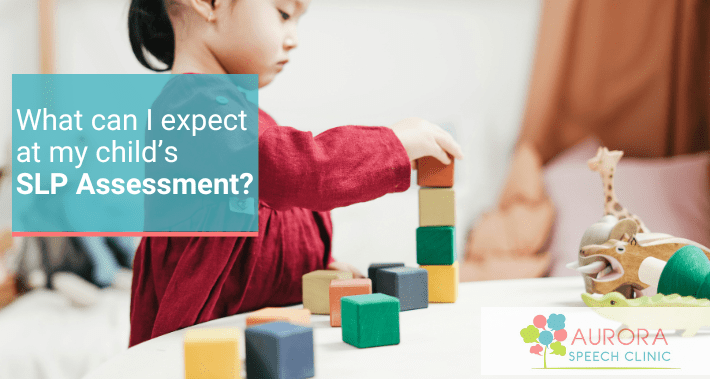
Embarking on the journey to support your child’s speech and language development can be both a hopeful and uncertain time. Understanding what to expect at your child’s assessment at Aurora Speech Clinic can alleviate some of that uncertainty and prepare your family for what we aim to make a positive experience for all.
Here is a comprehensive guide to the SLP assessment process:
But first, what should I tell my child before the assessment?
We believe that there should not be any stigma associated with getting a speech-language pathology assessment. Rather, it should be viewed similarly to going for a well-check with your doctor or getting a routine eye exam. When telling your child about their upcoming visit, we recommend using factual information that is appropriate to their age and, for older children, specific to the area(s) of concern. For example:
“We are going to meet a new friend and play with some toys”, “Mom needs to learn some strategies to support you with your reading” or, “The speech therapist is going to listen to your sounds and help you learn to say the tricky ones!”
For children who are older and/or aware or self-conscious of their communication challenges, it is particularly important to validate their feelings and acknowledge that everyone has their own strengths and things they are still learning. And of course, reassure them that the SLP is there to help!
Who and what should I bring to the assessment?
If you have any previous SLP reports or reports from other professionals on your child’s healthcare team, please feel free to bring those with you or send them in advance. For young children with suspected speech or language delays, it may be helpful to bring a list of words your child can say or take some videos of the way your child communicates at home.
Ideally, we recommended one or both caregivers attend the assessment but leaving siblings at home. We want to create an ideal testing environment for your child that is free from the distraction of well-meaning siblings.
Your Arrival
When you arrive at Aurora Speech Clinic, you will be greeted by one of our lovely receptionists. Please introduce yourself and then take a seat and relax. Your child may feel more comfortable sitting with you while you wait or exploring the toys in the waiting room. If you have a toddler and they have brought a toy from home- feel free to bring that into the assessment too. Try to avoid using screens while you wait as transitioning away from them can be hard for some children.
Your SLP will come out to greet you and take you to the assessment room, which will be set up with age-appropriate toys, games, and testing materials. Your child is encouraged to explore the room and the materials at their leisure.
Components of the Assessment
Caregiver Interview and Case History Review
By this time, you will have already filled out an intake questionnaire via your client portal in Jane (thank you!) and this information has helped the SLP prepare for the assessment. The appointment typically begins with reviewing the information and potentially gathering additional background information about your child’s developmental history, medical history, and any specific concerns you may have regarding their communication abilities. You may be asked to complete some supplementary forms or questionnaires.
The SLP will ask about your child’s communication in different settings such as home, daycare, school, or with peers. This holistic view ensures that the SLP understands how your child communicates in various environments.
While you chat with your assessing SLP, your child may be exploring the toys/activities and your clinician may already surreptitiously be gathering a ton of information about his/her skills. Alternatively, your child may prefer to sit with you until he/she becomes more comfortable. Your clinician will follow your child’s lead and go at their pace!
Observations and Play-Based Interactions
For young children, much of the assessment will be conducted through observation and play. The SLP will observe how your child interacts with you and will also engage your child in various play activities to elicit communication and evaluate specific speech and language milestones. The SLP will guide your involvement in the assessment, but generally, we encourage you to play with and engage your child as you typically would at home! Through what might look simply like play, your SLP will assess key areas such as:
– Speech Sounds: How your child pronounces different sounds and words.
– Language Comprehension: How well your child understands language.
– Expressive Language: How effectively your child uses words and sentences to express themselves.
– Social Communication: How your child uses language in social contexts, including joint attention, gestures, and turn-taking in conversation.
For older children, informal interactions will take place in the form of conversations. When asking about your child’s school, hobbies, favourite movies, etc. we are able to build rapport and also glean information about their speech and language skills.
Standardized Testing

Depending on your child’s age and your specific concerns, the SLP may administer standardized tests. These are structured activities that evaluate specific aspects of speech and language development more formally. Standardized tests provide valuable data that can be compared to developmental norms, helping to pinpoint specific areas of need. Standardized tests can be done with a wide age range: questions may start off easier and become more difficult. The nature of these tests is they are to be administered in a specific way, without cueing. Later in the assessment, we will see how your child does WITH additional cues and support.
Duration of the Assessment
At Aurora Speech Clinic, we tailor your child’s assessment to your specific concerns. That said, as children age, their communication abilities become more complex and there are potentially more areas to consider. While we typically book the first initial assessment appointment for 60 minutes, there are some assessment types that can take considerably longer and will therefore require additional appointments. Our assessment rates are billed per hour. Here are some estimates of assessment duration based on areas of concern.
Early communication assessment (under 3 years of age)~ 1 hour
Preschool communication assessment (ages 3-6)~ 1-2 hours
Articulation assessment~ 1 hour
School-Age Speech & Language Assessment~ 1-2 hours
School-Age Speech, Language & Literacy Assessment~ 2-3 hours
Please note that all assessments are individualized and lengths will vary. Your assessing SLP will discuss an assessment plan at the beginning of your visit, to ensure you are aware of and consent to the plan. While most caregivers tend to sit in and observe the entire duration of the assessment, some older children/teens prefer for their parents to step out during the standardized assessment. Whatever makes your child the most comfortable works for us!
Review of Findings and Next Steps
Once the assessment is complete, the SLP will give you her overall impressions. Your SLP may be able to make recommendations at the initial visit or, if standardized assessments were completed, she may need to score and analyze the findings in more detail before reviewing them with you. Either way, the SLP will explain the results of any standardized tests and observational assessments, providing a clear picture of your child’s current communication and/or literacy skills.
Individualized Treatment Plan
If the assessment indicates that your child would benefit from speech-language therapy, the SLP will develop an individualized treatment plan tailored to their specific needs. This plan will outline:
– Goals: Specific, measurable goals for your child’s communication.
– Therapy Techniques: The strategies and evidence-based treatment approaches that will be used to achieve these goals.
– Frequency and Duration: Recommendations for how often therapy sessions should occur and the expected duration of therapy.
At this time, we may also make referrals to other healthcare professionals such as: audiologists, occupational therapists, psychologists, etc.
Questions and Support
The assessment process is also an excellent opportunity for you to ask any questions you might have about your child’s development and the proposed treatment plan. The SLP will provide guidance on how you can support your child’s communication skills at home and what to expect in terms of progress.
Documentation
At Aurora Speech Clinic, our assessments include a report for your records. This will be available approximately 2 weeks after the assessment. When it is complete, you will be notified via email to log into your child’s Jane portal to access the report. You can also download and share it with whomever you would like at that time.
Conclusion
A speech-language pathology assessment is a thorough, child-centered process designed to understand your child’s unique communication needs. And it should be fun too!
By engaging in play, observation, and structured testing, the SLP gains a comprehensive view of your child’s communication abilities. With this information, you and the SLP can work together to create a supportive, effective therapy plan that fosters your child’s communication growth.
We look forward to meeting you and your child for the assessment!
Other FAQs regarding SLP assessments:
Does my child really need an assessment?
Yes. As regulated healthcare professionals, Speech-Language Pathologists must follow the practice standards outlined by the College of Audiologists and Speech-Language Pathologists of Ontario (CASLPO). CASLPO defines an assessment as the “Use of formal and/or informal measures by an audiologist or speech- language pathologist, in accordance with the registrant’s scope of practice, to determine a patient’s functioning in a variety of areas of functional communication and/or swallowing or hearing, resulting in specific treatment recommendations.” We are unable to make treatment recommendations and/or initiate treatment without an assessment.
Further, we acknowledge that speech therapy is a significant investment of time and money. By conducting a thorough assessment that accurately outlines the child’s communication profile, we can set goals that are going to be the most functional, most susceptible to remediation, and therefore the best investment. At ASC, we believe that therapy sessions are only as good as the goals they are targeting!
Can I use a report from elsewhere and skip the assessment?
Yes. We can use an assessment report from another registered Speech-Language Pathologist and dive right into treatment provided the assessment report is specific to the area you hoping to treat, thorough, recent and still accurately depicts your child’s skills and abilities. If your child has changed significantly since the previous assessment and/or you are seeking treatment in another area (e.g., you have a report specific to articulation but want support with language), we would need to complete a new one.
Will insurance cover the cost of an assessment?
Most supplemental health insurance plans do cover the cost of speech-language pathology services (aka “speech therapy”) but please reach out to your provider as ASC cannot guarantee reimbursement. ASC does not offer direct billing at this time but will provide you with a receipt that you can submit to your insurance provider.
372 Hollandview Trail, #302,
Aurora, ON L4G 0A5
(905) 503-4321
» https://goo.gl/maps/fg3XKnNsczzwLzTz7
Aurora Speech Clinic is located in Aurora, ON and offers personalized skilled intervention to those struggling with their speech and language skills. Services offered include screening, consultation, and comprehensive evaluation. We also provide one-on-one and/or group therapy for speech sound disorders, receptive/expressive language delay/disorder, stuttering/cluttering, accent reduction, and much more.